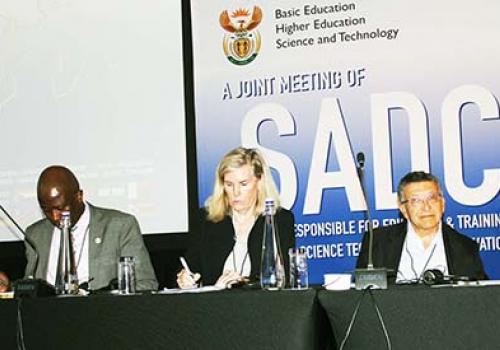The Southern African Development Community (SADC) Ministers responsible for Education and Training and Science Technology and Innovation on 20 June 2018 held a Ministerial Policy Dialogue at Zimbali Resort in Durban, South Africa to deliberate on the position of SADC in relation to the Fourth Industrial Revolution.
The Policy Dialogue was held in the margins of the Joint Meeting of Ministers Responsible for Education and Training and Science, Technology and Innovation scheduled for 21 - 22, June 2018.
In her remarks, the Director of Social and Human Development at the SADC Secretariat, Ms. Duduzile Simelane thanked the Government of South Africa for its hospitality and support in hosting the meeting. Ms. Simelane pointed out that the dialogue was meant to discuss the position of SADC in relation to the Fourth Industrial Revolution which is envisaged to bring about fundamental changes to the economics of virtually every industry in the SADC region and the world at large.
The Deputy Minister of Basic Education for the Republic of South Africa, Honourable Enver Surty called on the Ministers to prioritise digitalisation and technology and innovation in order to achieve meaningful development in the SADC region. The Deputy Minister implored SADC to work quicker and harder to achieve the digitalization of data and connectivity, with particular attention on research collaboration on academic learning so as to change and transform the African Child.
During the event, the Director of Square Kilometre Array (SKA) project of South Africa Project, Dr. Bernie Fanaroff made a presentation under the theme “Digitization and Industry 4.0 Implications for Science Technology and Innovation and Skills Development”. In his presentation, Dr. Fanaroff said the effects of technology are gradually beginning to transform the world and bringing new experiences to humankind. He, therefore, urged the SADC region to work through joint projects and leapfrog directly to latest technologies and improve on technologies development, focused investment, provision of necessary infrastructure and continued support on existing expertise.
The other presentation was on digital skills delivered by the International Labour Organisation (ILO) while African Academy of Science (AAS) delivered a presentation respondent on digitization and Industry 4.0- Implications for Science Technology and Innovation and Skills Development.
Ministers noted the following challenges with regard to digitalization in the region:
- Lack of information on the current status of digitalization in terms of strengths, weakness challenges and opportunities
- The current education system does not respond to the needs of industry and emerging technological evolution due to inadequate involvement of industry in the design and delivery of curricula
- The region is lagging in terms of industrial revolution
- Existence of stigma against vocational education which affects the involvement of youth in TVET
- Government not giving adequate financial resources to STI
- Inadequate sharing of information and experiences on digitalization and STI
- Lack of IT infrastructure particularly in the rural areas
- I adequate involvement of private sector in driving digitalization
- Lack of visibility of STI in most Member States
- Weak or absence of policy and legal frameworks for STIs
- Lack of recognition of the role of informal sector in STI
Ministers came up with the following recommendations in order to address the above challenges:
- Assessment of Current Situation in the region in terms of Digitalization focusing on strengthens, weaknesses, challenges and opportunities; and identification of gaps and collaborating partners
- Restructuring of the education system to make it relevant to the needs of the changing world
- Development of national and regional policy and legal frameworks for digitalization
- Promotion of the visibility of TVET and STI as tools to enhance industrialization
- Promote the involvement of private sector in digitalization
- Promote dialogue among stakeholders to develop common vision and strategies, and to share experiences and best practices on digitalization
- Recognition, commercialization and promotion of innovations from the informal sector; and
- Development of clear roadmap for digitalization

